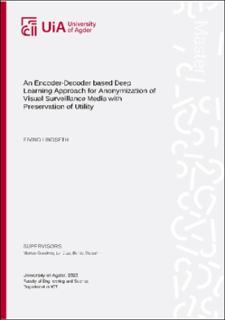| dc.contributor.author | Lindseth, Eivind | |
| dc.date.accessioned | 2020-10-19T08:10:24Z | |
| dc.date.available | 2020-10-19T08:10:24Z | |
| dc.date.issued | 2020 | |
| dc.identifier.citation | Lindseth, E. (2020) An Encoder-Decoder based Deep Learning Approach for Anonymization of Visual Surveillance Media with Preservation of Utility | en_US |
| dc.identifier.uri | https://hdl.handle.net/11250/2683521 | |
| dc.description | Master's thesis in Information- and communication technology (IKT590) | en_US |
| dc.description.abstract | The field of computer vision has seen significant progress recently fol-lowing innovations in deep learning neural networks. Activity can be identified from surveillance cameras. Automatic detection of unwanted incidents would enable police to act quickly with appropriate resources. Activity detecting machine learning algorithms need many examples in its learning phase. However, videos from surveillance cameras may contain privacy-sensitive information. The videos are not allowed to be used outside of the police unless anonymized. However, traditional anonymization techniques remove visual information, reducing utility as training data. This thesis introduces a method for anonymization of visual surveil-lance media, with preservation of utility. A face is anonymized by applying changes to many facial attributes using a novel encoder-decoder face editing network. This results in a natural-looking non-existing face that has a high chance of being detected. The editing process is controlled by attributes, but it is not known which combinations are suitable. The selection process is explored, and it is shown that attributes for best performance must be set individually per face. The amount of change applied is measured using face embedding distance. We measure the anonymization rate using are verse image search and learn the distance number to achieve anonymization. By proper selection of editing attributes it possible to achieve both high anonymization and high face detection. This thesis did not attempt to find the optimum attribute model. Other problems discovered needs to be resolved also. | en_US |
| dc.language.iso | eng | en_US |
| dc.publisher | University of Agder | en_US |
| dc.rights | Attribution-NonCommercial-NoDerivatives 4.0 Internasjonal | * |
| dc.rights.uri | http://creativecommons.org/licenses/by-nc-nd/4.0/deed.no | * |
| dc.subject | IKT590 | en_US |
| dc.title | An Encoder-Decoder based Deep Learning Approach for Anonymization of Visual Surveillance Media with Preservation of Utility | en_US |
| dc.type | Master thesis | en_US |
| dc.rights.holder | © 2020 Eivind Lindseth | en_US |
| dc.subject.nsi | VDP::Teknologi: 500::Informasjons- og kommunikasjonsteknologi: 550 | en_US |
| dc.source.pagenumber | 90 | en_US |

